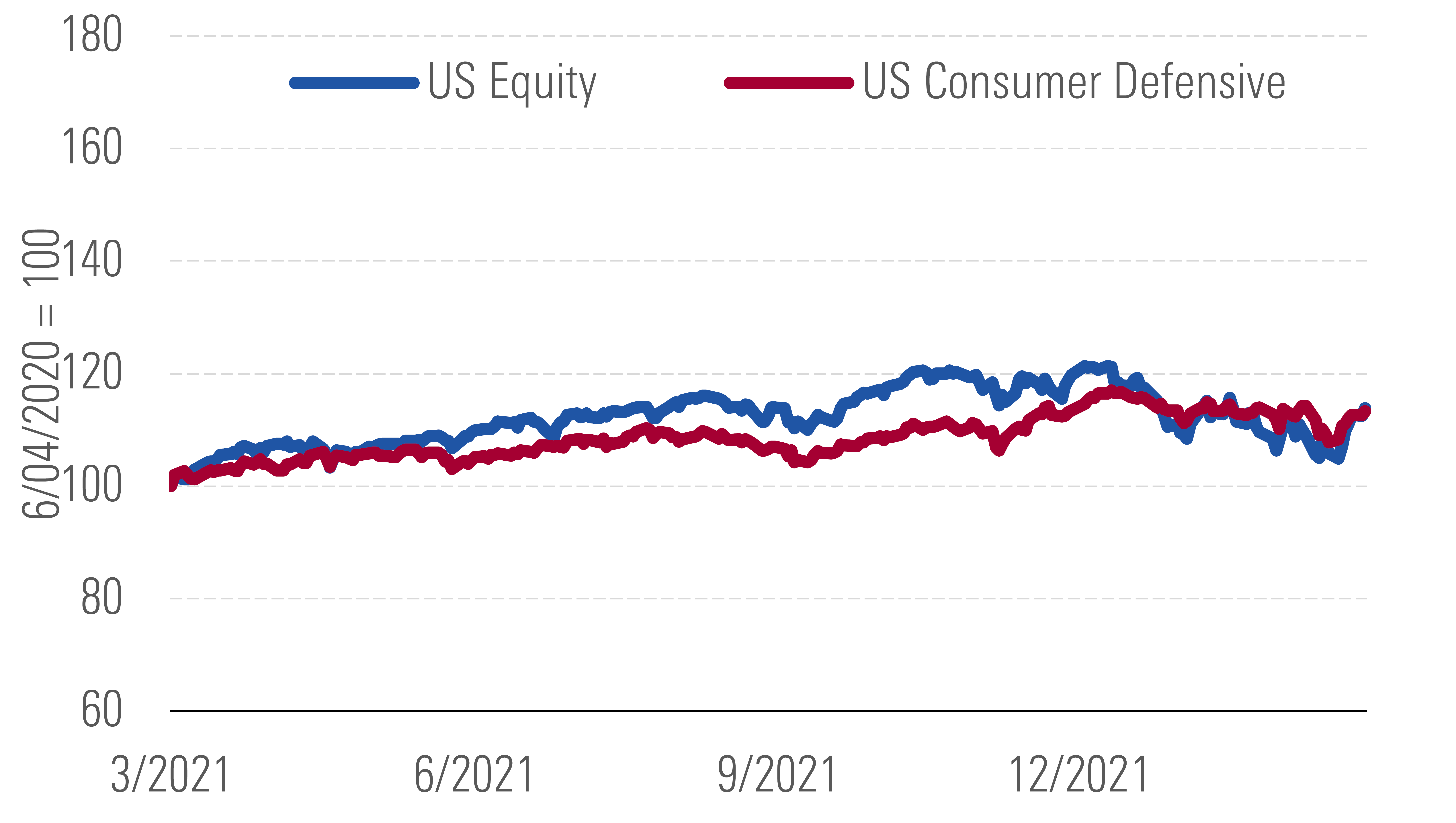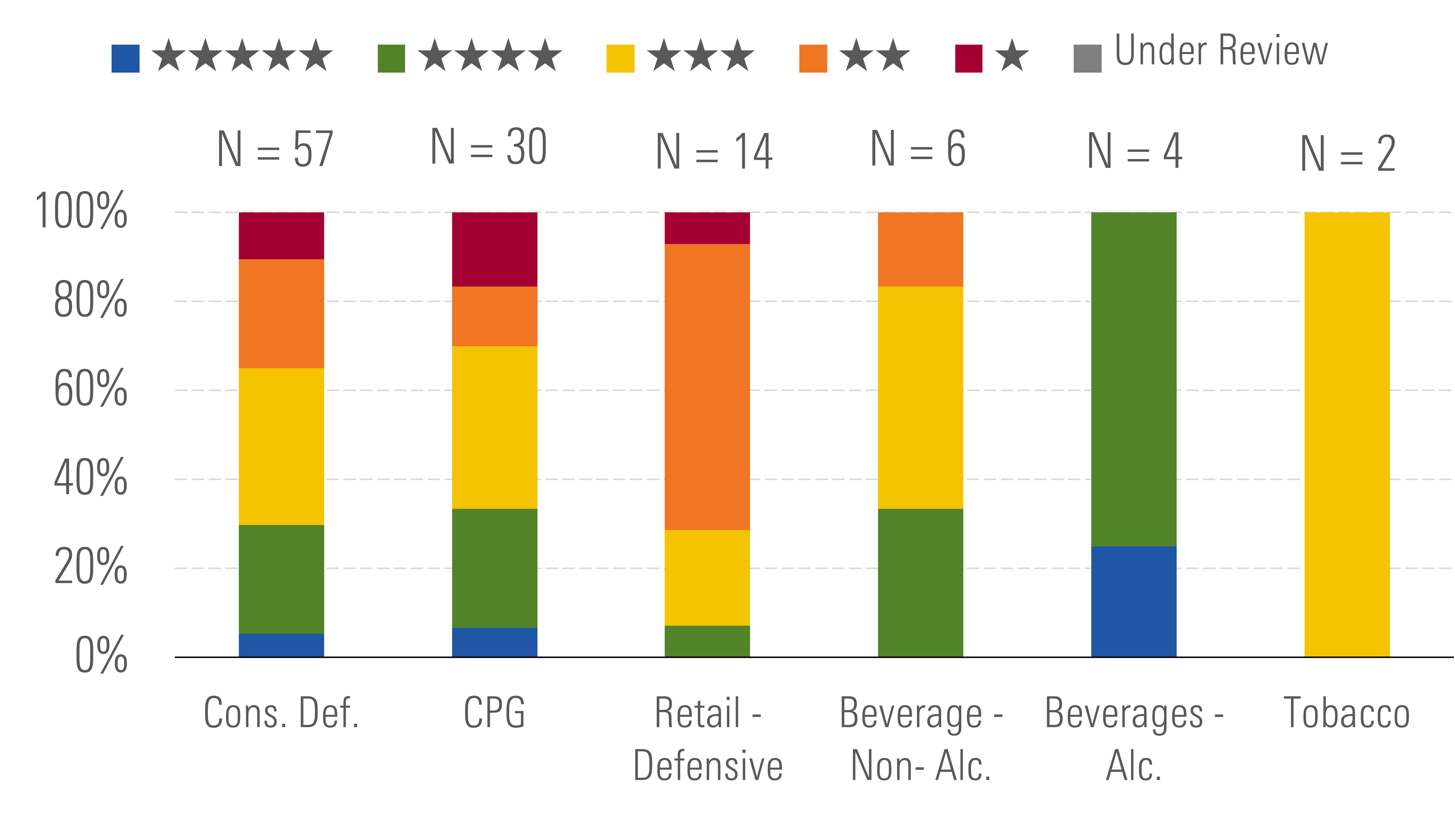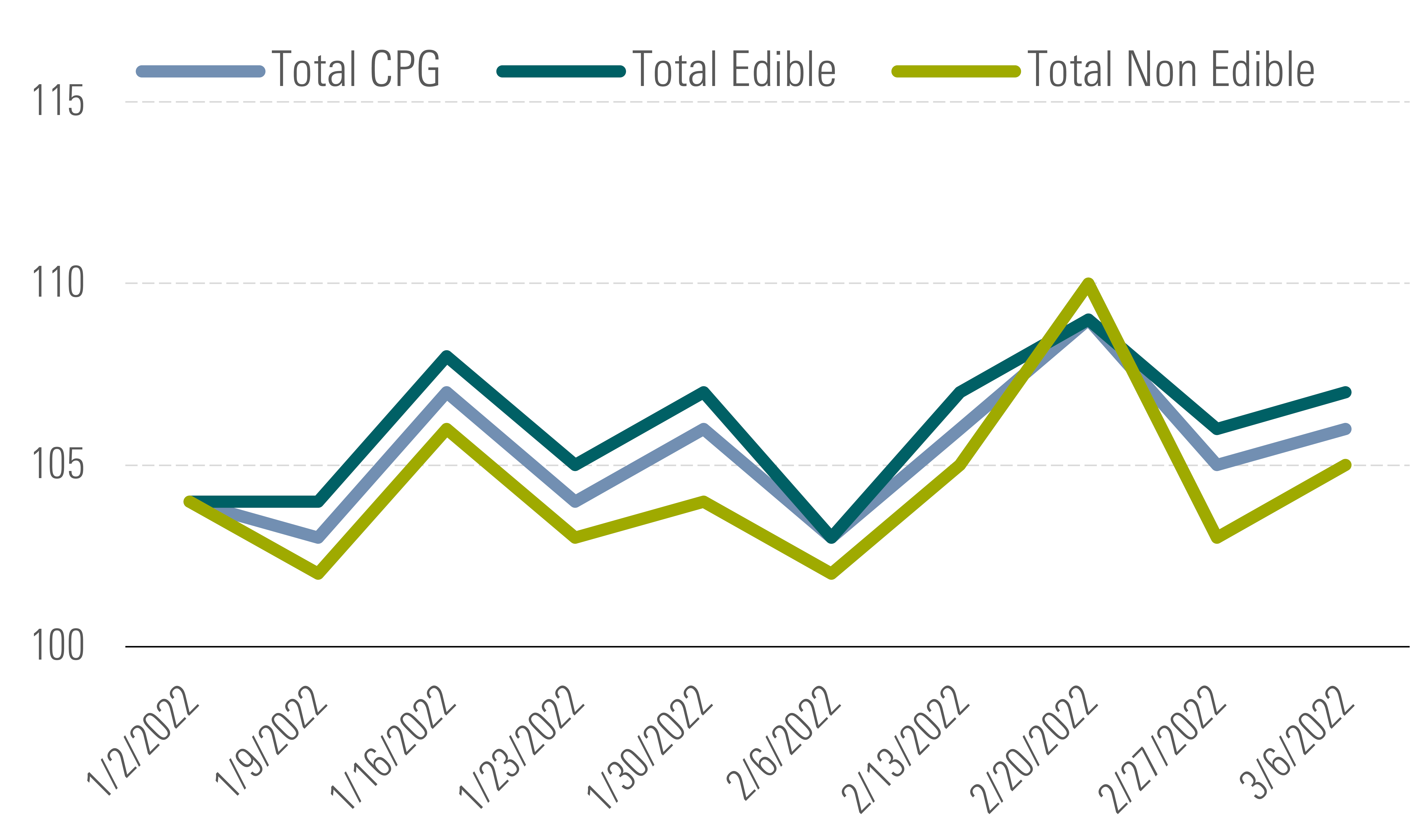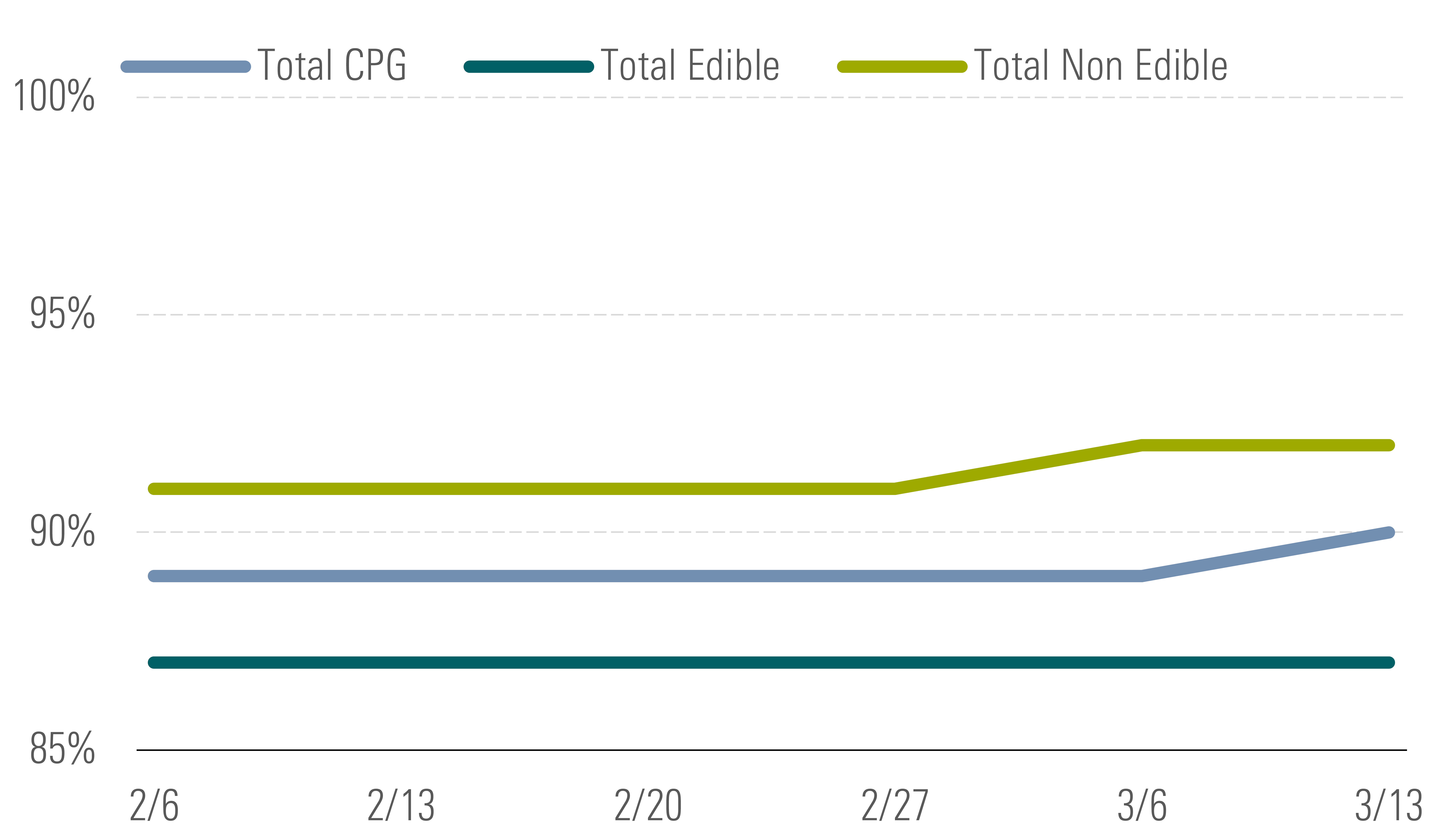Consumer Defensive Resilient, but Mostly Fairly Valued
Strong brands are in the best position to weather any challenges.
The consumer defensive sector proved relatively resilient despite turbulent market conditions in the first quarter, sliding 2% through March 25, while the broader equity market dropped a more sizable 5%.
Exhibit 1: Consumer defensive outperformed the broader market this quarter.

- source: Morningstar
As such, investors seeking opportunities in the sector will find a dearth of options, with our consumer defensive coverage trading at our median fair value estimates versus the 2% discount for our North American coverage. This translates to 30% of our consumer defensive coverage rated 4 or 5 stars, with the majority falling in the consumer products and beverage aisles. We suspect shares have been hampered by inflation and uncertainty about firms' ability to withstand such pronounced margin pressure. But we think these concerns are overblown, given the enhanced levels of brand investment firms began employing even before the pandemic took hold.
Exhibit 2: Bargains remain among consumer packaged goods and alcoholic beverages.

- source: Morningstar
And despite stepped-up prices at the shelf to offset these higher costs (related to raw materials, wages, packaging, transportation, and logistics), consumer demand remains elevated. According to IRI, consumer purchases (by dollar sales) across a diverse array of product categories remain on an upward trajectory versus a year ago. However, we don’t expect this trend to persist, as more consumers may opt to trade down to lower-price private-label products as pocketbooks become strained. But we contend that firms with strong brand intangible assets that instill value through ongoing brand-building initiatives (such as research, development, and marketing) are poised to navigate these challenges relatively unscathed.
Exhibit 3: Consumer demand stays strong, despite raging inflation.

- source: Morningstar
Although demand has been heated, stock at the shelf remains deficient, stemming from supply chain disruptions and labor shortages, which are unlikely to be alleviated over the near term. As illustrated by the IRI CPG Supply Index, 10% of total consumer packaged goods have been out of stock the past few months, with edible items reapproaching the worst in-stock level during the pandemic. However, we surmise operators have been employing multiple levers by which to catch up, including selectively adding capacity, funneling volumes through co-manufacturers, and narrowing their product set to focus on the fastest-turning stock-keeping units. We view these steps as a prudent way to support the entrenched retail relationships leading brands boast.
Exhibit 4: However, supply levels at the shelf continue to underwhelm.

- source: Morningstar
Top Picks
Kellogg K Star Rating: ★★★★ Economic Moat Rating: Wide Fair Value Estimate: $87 Fair Value Uncertainty: Medium
At a 30% discount to our valuation, we think investors should consider wide-moat Kellogg. Years before COVID-19 came on the scene, Kellogg started taking steps to alter its mix toward more attractive areas (from a category and geographic perspective), which we believe the market fails to appreciate. More specifically, over the past decade, Kellogg has strategically shifted its product mix away from the mature cereal aisle toward on-trend snacking. In addition, this wide-moat operator has pursued inorganic means to build out its reach in faster-growing emerging markets (which now account for around 25% of its sales base).
Boston Beer SAM Star Rating: ★★★★★ Economic Moat Rating: Narrow Fair Value Estimate: $750 Fair Value Uncertainty: Medium
Shares of narrow-moat Boston Beer, a leader in U.S. high-end malt beverage and adjacent categories, trade about 49% below our intrinsic valuation. We posit that the firm has shown a proclivity to augment its portfolio in alignment with the latest growth vectors and capture a disproportionate share of the economic rents generated from this growth by being one of the first movers. While seltzer trends have slowed, we think Boston Beer's sales will remain supported by secular consumption shifts (such as the desire for a low-sugar footprint and varied flavor profiles), evidenced by the recent launch of the hard seltzer Truly Margarita).
Beyond Meat BYND Star Rating: ★★★★★ Economic Moat Rating: None Fair Value Estimate: $98 Fair Value Uncertainty: High
Beyond Meat shares are attractive, trading at a 50% discount to our $98 fair value estimate. We think investor fears about slowing U.S. retail demand for plant-based meat are unwarranted, as the slowdown appears to be the result of the pandemic-driven surge in 2020. In our view, growth should reaccelerate in 2022 with the expanded launch of McDonald's McPlant in multiple geographic regions and the co-creation of products with Yum Brands for various fast-food chain restaurants across the world. As primary growth drivers, we expect these deals will collectively result in over $200 million in incremental annual revenue by 2025.

/s3.amazonaws.com/arc-authors/morningstar/c612f59b-89e0-422a-8f71-3eb1300d1a2c.jpg)
/cloudfront-us-east-1.images.arcpublishing.com/morningstar/I53I52PGOBAHLOFRMZXFRK5HDA.jpg)
/cloudfront-us-east-1.images.arcpublishing.com/morningstar/CEWZOFDBCVCIPJZDCUJLTQLFXA.jpg)
/cloudfront-us-east-1.images.arcpublishing.com/morningstar/TQKIUI6SDRCQFMUBSWCMD7OKPI.jpg)
:quality(80)/s3.amazonaws.com/arc-authors/morningstar/c612f59b-89e0-422a-8f71-3eb1300d1a2c.jpg)